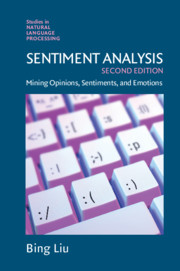Book contents
- Sentiment Analysis
- Studies in Natural Language Processing
- Sentiment Analysis
- Copyright page
- Contents
- Preface
- Acknowledgments
- 1 Introduction
- 2 The Problem of Sentiment Analysis
- 3 Document Sentiment Classification
- 4 Sentence Subjectivity and Sentiment Classification
- 5 Aspect Sentiment Classification
- 6 Aspect and Entity Extraction
- 7 Sentiment Lexicon Generation
- 8 Analysis of Comparative Opinions
- 9 Opinion Summarization and Search
- 10 Analysis of Debates and Comments
- 11 Mining Intent
- 12 Detecting Fake or Deceptive Opinions
- 13 Quality of Reviews
- 14 Conclusion
- Appendix
- Bibliography
- Index
7 - Sentiment Lexicon Generation
Published online by Cambridge University Press: 23 September 2020
- Sentiment Analysis
- Studies in Natural Language Processing
- Sentiment Analysis
- Copyright page
- Contents
- Preface
- Acknowledgments
- 1 Introduction
- 2 The Problem of Sentiment Analysis
- 3 Document Sentiment Classification
- 4 Sentence Subjectivity and Sentiment Classification
- 5 Aspect Sentiment Classification
- 6 Aspect and Entity Extraction
- 7 Sentiment Lexicon Generation
- 8 Analysis of Comparative Opinions
- 9 Opinion Summarization and Search
- 10 Analysis of Debates and Comments
- 11 Mining Intent
- 12 Detecting Fake or Deceptive Opinions
- 13 Quality of Reviews
- 14 Conclusion
- Appendix
- Bibliography
- Index
Summary
By now, it should be quite clear that words and phrases that convey positive or negative sentiment are instrumental for sentiment analysis. This chapter discusses how to compile such word lists. In the research literature, sentiment words are also called opinion words, polar words, or opinion-bearing words. Positive sentiment words such as beautiful, wonderful, and amazing are used to express some desired states or qualities, while negative sentiment words such as bad, awful, and poor are used to express some undesired states or qualities. In addition to individual words, there are sentiment phrases and idioms – for example, cost an arm and a leg. Collectively, they are called the sentiment lexicon (or opinion lexicon). From now on, when we say sentiment words, we mean both individual words and phrases.
- Type
- Chapter
- Information
- Sentiment AnalysisMining Opinions, Sentiments, and Emotions, pp. 227 - 242Publisher: Cambridge University PressPrint publication year: 2020
- 1
- Cited by

